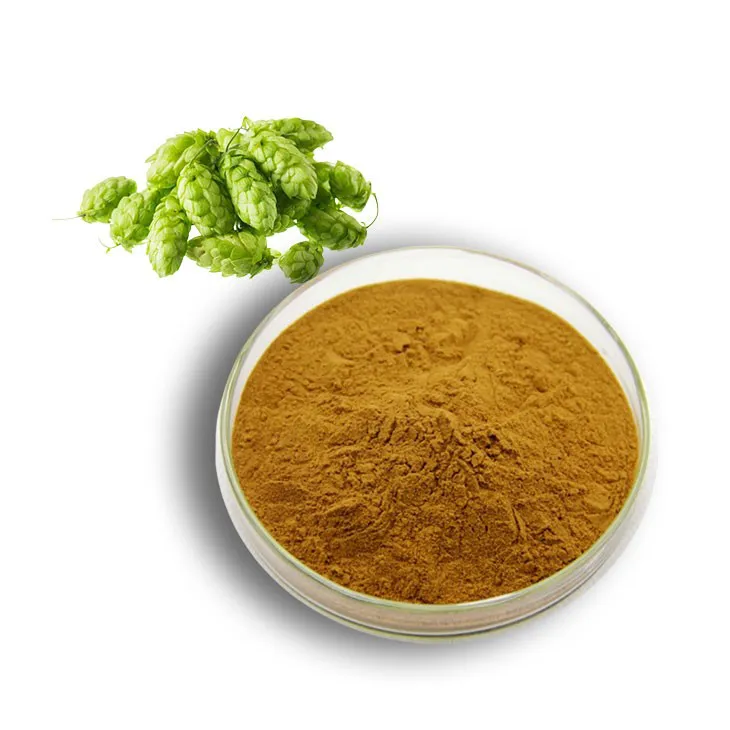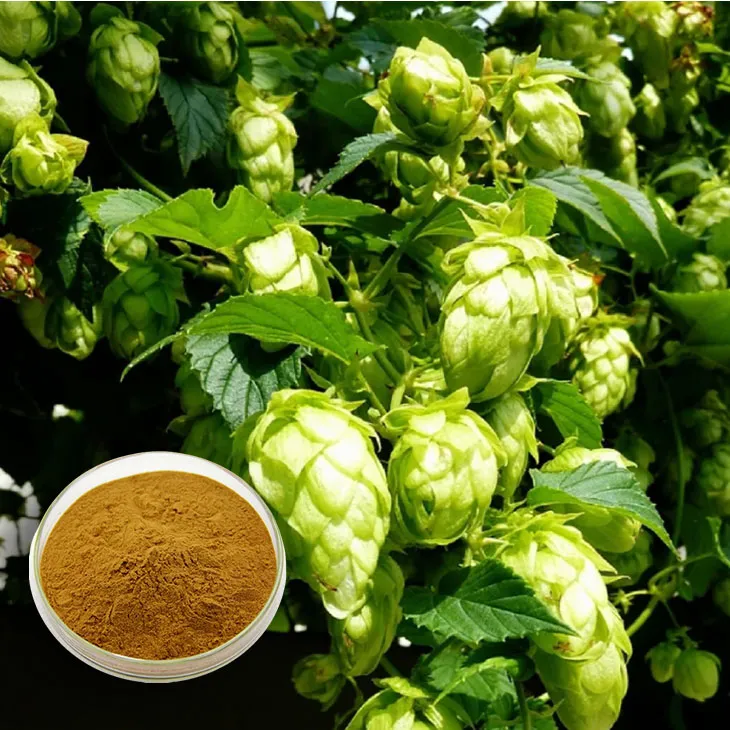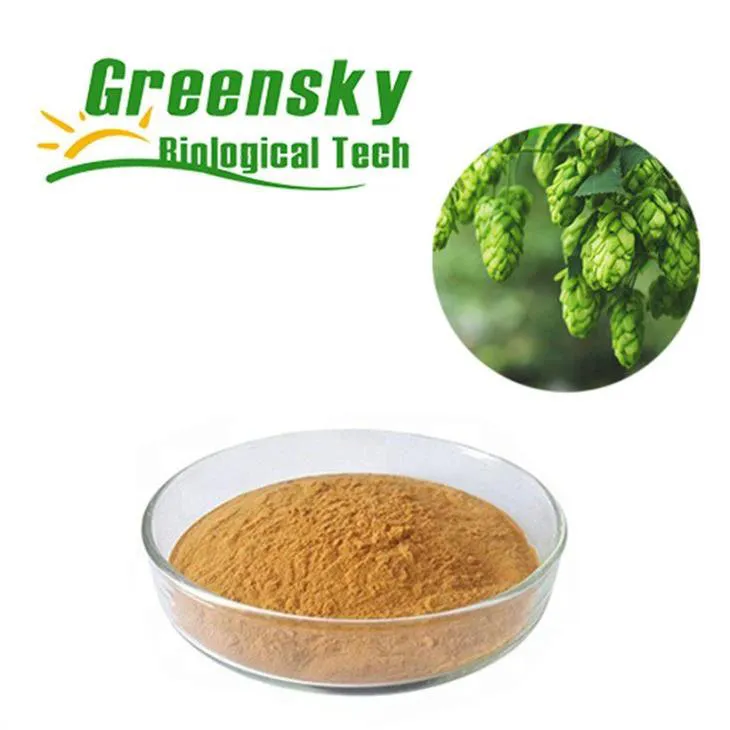- 0086-571-85302990
- sales@greenskybio.com
Nature's Bounty Hops Extract.
2024-12-01

1. Introduction to Hops Extract
Hops Extract is a natural substance that has captured the attention of various industries and researchers alike. Derived from the hops plant, it has a long history of use, especially in the brewing of beer. However, its significance extends far beyond the realm of beverage production.

2. Hops Extract in Beer - Brewing
2.1 The Essence of the Hoppy Taste
In the world of beer - brewing, hops extract is an indispensable ingredient. It is responsible for bestowing upon beer that characteristic hoppy taste that beer enthusiasts around the globe passionately seek. This unique flavor is not a simple, one - dimensional taste but rather a complex amalgamation of various elements. Different varieties of hops contribute their own distinct flavors, creating a diverse range of taste profiles.
2.2 The Role of Different Hops Varieties
For example, some hops varieties may impart a floral note to the beer, while others might bring out a more citrusy or piney flavor. This diversity allows brewers to experiment and create a wide variety of beer styles. A brewer might choose a particular hops variety to achieve a refreshing, light - bodied lager with a subtle hoppy finish, or opt for a more robust hops blend to produce a full - bodied, bitter IPA (India Pale Ale). The art of brewing lies in the careful selection and combination of hops to achieve the desired flavor balance.

3. Hops Extract and Health
3.1 Hormonal Balance
On the health front, hops extract has become an area of growing interest. One of the potential areas of its impact is in hormonal balance. Some preliminary research suggests that hops extract may have an influence on estrogen levels. However, it is important to note that while these initial findings are intriguing, more studies are needed to comprehensively understand this relationship. The potential implications of hops extract on hormonal health could be far - reaching, but until further research is conducted, we can only hypothesize about its true significance in this regard.
3.2 Other Potential Health Benefits
Aside from hormonal aspects, there are also other potential health benefits associated with hops extract that are being explored. Some studies have indicated that it may possess anti - inflammatory properties. This could potentially make it useful in the management of certain inflammatory conditions. Additionally, there is some speculation that hops extract may have a role in promoting relaxation, although the exact mechanisms for this are not yet fully understood. It could potentially interact with the body's neurotransmitter systems, but further research is required to confirm these hypotheses.

4. Hops Extract and the Environment
4.1 Positive Environmental Impacts
The cultivation of hops plants for extract production can have positive environmental impacts. When managed properly, it can contribute to local biodiversity. Hops plants can provide a habitat for a variety of insects, birds, and other small animals. For instance, the flowers of the hops plant can attract pollinators such as bees, which are crucial for the overall health of the ecosystem. Additionally, well - maintained hops fields can prevent soil erosion, as the roots of the plants help to hold the soil in place.
4.2 Negative Environmental Impacts
On the other hand, large - scale cultivation of hops for extract production also presents some environmental challenges. One of the main concerns is the use of agricultural practices that may not be sustainable. For example, excessive use of pesticides and fertilizers can have a negative impact on the surrounding environment. Pesticides can harm non - target organisms, including beneficial insects and soil microorganisms. Fertilizer runoff can lead to water pollution, causing problems such as algal blooms in nearby water bodies. Another issue is the large amount of water required for hops cultivation, which can put a strain on local water resources, especially in areas where water is already scarce.
5. Cultivation and Production of Hops Extract
5.1 The Cultivation Process
Hops are typically grown in temperate regions. The cultivation process begins with the selection of suitable hop varieties for the local climate and soil conditions. Hops plants are climbing vines that require support structures, such as trellises, to grow properly. They need a certain amount of sunlight, water, and nutrients to thrive. Farmers must carefully monitor the growth of the plants, protecting them from pests and diseases. Pruning is also an important part of the cultivation process, as it helps to direct the plant's energy towards the production of high - quality hops cones.
5.2 The Extraction Process
Once the hops cones are harvested, the extraction process begins. There are different methods of extracting hops extract, including solvent - based extraction and supercritical CO₂ extraction. Solvent - based extraction involves using solvents such as ethanol or hexane to dissolve the active compounds in the hops. However, this method requires careful handling of the solvents to ensure that no residues are left in the final product. Supercritical CO₂ extraction, on the other hand, is a more advanced and "cleaner" method. In this process, carbon dioxide is pressurized and heated to a supercritical state, where it has properties of both a liquid and a gas. This supercritical CO₂ can effectively extract the desired compounds from the hops without leaving behind harmful residues.
6. The Future of Hops Extract
6.1 Brewing Innovations
In the brewing industry, the future of hops extract looks promising. Brewers are constantly seeking new ways to innovate and create unique beer flavors. With the increasing availability of different types of hops extract, they have more tools at their disposal. We can expect to see more experimental beer styles emerging, as brewers combine different hops extracts and brewing techniques. For example, the use of hops extract in low - alcohol or non - alcoholic beers could open up new market segments, as consumers become more health - conscious but still desire the hoppy flavor.
6.2 Health Research and Applications
In terms of health research, the future holds great potential for hops extract. As more studies are conducted, we may gain a deeper understanding of its effects on hormonal balance and other health aspects. If the potential anti - inflammatory and relaxation - promoting properties are further validated, hops extract could find applications in the development of new pharmaceuticals or dietary supplements. However, strict regulatory requirements will need to be met to ensure the safety and efficacy of these products.
6.3 Sustainable Cultivation
Regarding the environment, the future of hops extract production will likely see a greater emphasis on sustainable cultivation practices. This could involve the development of more environmentally - friendly pesticides and fertilizers, as well as more efficient water management techniques. Additionally, there may be an increased focus on promoting biodiversity in hops fields through agro - ecological approaches. By addressing the negative environmental impacts associated with hops cultivation, the industry can ensure its long - term viability while also contributing to environmental conservation.
7. Conclusion
Hops extract is truly a multi - faceted substance with significant implications in beer - brewing, health, and the environment. Its unique properties in creating the hoppy taste in beer are well - established, while its potential health benefits and environmental impacts are areas of ongoing research. As we move forward, it is crucial that we continue to explore and understand all aspects of hops extract, from its cultivation and production to its various applications. By doing so, we can ensure that this natural bounty is utilized in a way that maximizes its benefits while minimizing any negative consequences.
FAQ:
What is hops extract used for in beer - brewing?
Hops extract is used in beer - brewing to create the unique hoppy taste that beer lovers like. It also adds complexity to the flavor, and different types of hops can result in different taste characteristics.
How does hops extract potentially affect hormonal balance?
Some research shows that hops extract may have an impact on estrogen levels, but more studies are required to comprehensively understand this relationship regarding its role in hormonal balance.
What are the positive environmental impacts of hops plant cultivation for extract production?
If managed properly, the cultivation of hops plants for extract production can contribute to local biodiversity.
What are the negative environmental impacts of large - scale hops cultivation?
Large - scale cultivation may need certain agricultural practices. If these are not sustainable, it can cause environmental harm, although the specific details depend on the actual farming methods used.
Are there different types of hops extract?
Yes, there are different varieties of hops, and each variety can produce a different hops extract with distinct characteristics, which can be reflected in the taste profiles they contribute to beer or potentially in other applications.
Related literature
- The Role of Hops in Brewing: From Tradition to Innovation"
- "Hops Extract and Hormonal Regulation: Current Research and Future Directions"
- "Sustainable Hops Cultivation: Environmental Considerations and Best Practices"
- ▶ Hesperidin
- ▶ Citrus Bioflavonoids
- ▶ Plant Extract
- ▶ lycopene
- ▶ Diosmin
- ▶ Grape seed extract
- ▶ Sea buckthorn Juice Powder
- ▶ Fruit Juice Powder
- ▶ Hops Extract
- ▶ Artichoke Extract
- ▶ Mushroom extract
- ▶ Astaxanthin
- ▶ Green Tea Extract
- ▶ Curcumin
- ▶ Horse Chestnut Extract
- ▶ Other Product
- ▶ Boswellia Serrata Extract
- ▶ Resveratrol
- ▶ Marigold Extract
- ▶ Grape Leaf Extract
- ▶ New Product
- ▶ Aminolevulinic acid
- ▶ Cranberry Extract
- ▶ Red Yeast Rice
- ▶ Red Wine Extract
-
Lotus leaf extract
2024-12-01
-
Citrus Aurantium Extract
2024-12-01
-
Propolis Extract Powder
2024-12-01
-
Yellow Pine Extract
2024-12-01
-
Acerola Extract
2024-12-01
-
Motherwort Extract
2024-12-01
-
Centella Asiatica Extract
2024-12-01
-
Pomegranate Extract
2024-12-01
-
Kupilu Extract
2024-12-01
-
Uridine-5'-monophosphate Disodium salt
2024-12-01





















